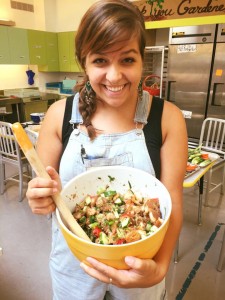“What are you going to DO with that?”
Sometimes, the pause is almost worse than the question. The pause after I tell someone that I’m studying Sustainable Agriculture, the pause that’s accompanied by a quiet intake of breath, a thoughtful look, a slight head tilt, and followed by, “So…what are you going to do with that?”
Okay, perhaps I’m being a little dramatic. But I hear this question like 20 times a day (sorry, my inner drama queen just won’t shut up today). And if you go to Messiah and know someone who is majoring in Sustainability, you have probably wondered the same thing. For this week’s blog, I decided to feature a Sustainability alum and tell what she’s doing with her degree.
Meet Alex Nordquist, who graduated from Messiah in May 2015 with a major in Sustainable Community Development and a minor in Nutrition. She is currently working with FoodCorps, a nationwide initiative to connect kids to real food by creating healthier school food environments. I conducted an email interview with Alex to find out more about her job.
Where? Alex works in a Pre-K through 5th grade elementary school in The Bronx. Her specific placement is with a project called Edible Schoolyard NYC.
Why? Alice Waters founded the Edible Schoolyard Project with this vision: “Every child needs to learn how to cook, needs to learn how to cultivate a garden, plant seeds, learn about sustainability, be taken to a garden, and be able to put hands in the Earth.”
What? I asked Alex what her role is within the project, and she actually does on a day-to-day basis. For those of you who, like me, quiver in fear at the thought of sitting in a cubicle for 8 hours a day, get excited–Alex’s responsibilities include:
- setting up monthly cooking and gardening classes
- preparing tastings of yummy veggie recipes in the cafeterias to expose students to healthy food
- integrating edible and sustainable curriculum into cooking and gardening classes that she teaches
- maintaining the outdoor garden space and indoor aeroponics gardens
- other random activities that need done that day: like gathering worms from the garden for a science class
How? Alex’s cites her learning about sustainability through a lens of community and urban development at Messiah as good preparation to be part of a project focusing on urban issues, needs, and community trends. FoodCorps has provided her with the opportunity to combine her passions of sustainability, food, and social justice…and to use both her nutrition and sustainability knowledge.
“Of course, all the classroom time in the world could have never prepared me for some of the challenges I see in Bronx schools everyday, but because of my education, I have a larger-scale understanding of the systems of poverty, oppression, and injustice that have created such deeply rooted inequities in New York City.”
Hey, that’s pretty neat, eh? I must admit that I got pretty excited about FoodCorps after reading about Alex’s experience. If you did too and would like more information, check out https://foodcorps.org/, or feel free to email me or stop in at the Sustainability Office if you would like to hear more about Alex’s experience. Hopefully this post has began to answer the question, “wait, so what are you going to do with a sustainability major?”.
Until next time,
Alisha
PS: one more quote that was too eloquent to leave out (Alex is responding to my question of how FoodCorps and Edible NYC are contributing to sustainable initiatives in their community):
“Edible education is all about exposing people to a healthier way of life, and it has the power to fight a number of social issues, such as hunger and poverty, and health issues such as obesity, diabetes, and heart disease. 100% of my students are people of color, and more than 50% of their families are homeless or live in temporary housing. The kind of social empowerment that comes from learning to grow your own food as part of a public school education is something that I believe to be incredibly powerful. The opportunity to be presented with an alternative food system is a radical form of social change.” -Alex Nordquist
Posted on October 21st, 2015 by as1635@messiah.edu
Filed under: Fall 2015

Leave a Reply